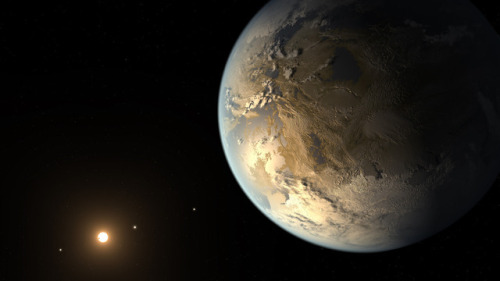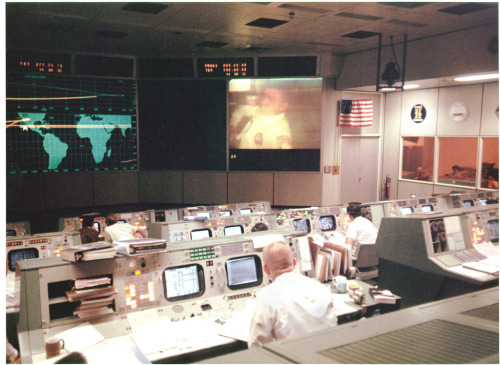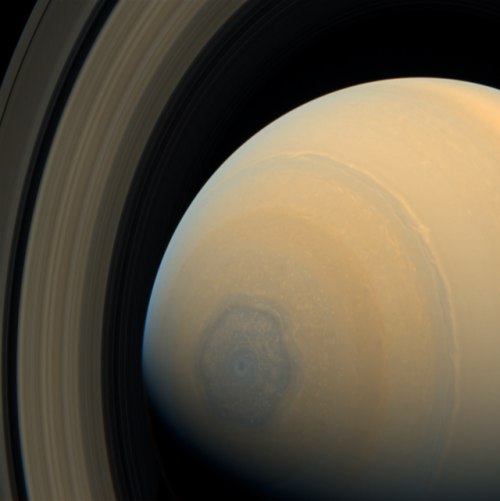Astonishing Saturn, Observed By The Cassini Space Probe On November 27, 2013.

Astonishing Saturn, observed by the Cassini space probe on November 27, 2013.
More Posts from Decimatethestars-blog and Others

Kepler-186f, the first Earth-size Planet in the Habitable Zone
js
Colors of Earth
When we think of our globe from a distance, we generally visualize two colors: blue and green. Water and land. Mostly water, consequently, our planet’s nickname of the blue marble.
Traveling around the globe every 90 minutes covering millions of miles with a focused lens on our beautiful planet from 250 miles above, I’ve captured many beautiful colors beyond blue and green that showcase Earth in new and interesting ways. Some colors are indicative of nature like desert sands and weather like snow. Other colors tell stories of Earth’s climate in bright splashes of yellows and greens of pollen and muted grey tones and clouded filters of pollution.
Blue and green still remain vivid and beautiful colors on Earth from the vantage point of the International Space Station, but here are some other colors that have caught my eye from my orbital perspective.

African violet

Bahamas blues

Tropical in Africa

Yellow desert

Orange in Egypt

Red surprise

Snow white
Follow my Year In Space on Twitter, Facebook and Instagram!








TODAY IN HISTORY: Apollo 16 astronauts Charlie Duke and John Young train for the Moon at Kennedy Space Center in Florida, November 30, 1971.
(NASA)
What's Up - December 2017
What’s Up For December? Geminid and Ursid meteor showers & winter constellations!

This month hosts the best meteor shower of the year and the brightest stars in familiar constellations.

The Geminds peak on the morning of the 14th, and are active from December 4th through the 17th. The peak lasts for a full 24 hours, meaning more worldwide meteor watchers will get to see this spectacle.

Expect to see up to 120 meteors per hour between midnight and 4 a.m. but only from a dark sky. You’ll see fewer after moonrise at 3:30 a.m. local time.

In the southern hemisphere, you won’t see as many, perhaps 10-20 per hour, because the radiant never rises above the horizon.

Take a moment to enjoy the circle of constellations and their brightest stars around Gemini this month.

Find yellow Capella in the constellation Auriga.

Next-going clockwise–at 1 o'clock find Taurus and bright reddish Aldebaran, plus the Pleiades.

At two, familiar Orion, with red Betelguese, blue-white Rigel, and the three famous belt stars in-between the two.

Next comes Leo, and its white lionhearted star, Regulus at 7 o'clock.

Another familiar constellation Ursa Major completes the view at 9 o'clock.

There’s a second meteor shower in December, the Ursids, radiating from Ursa Minor, the Little Dipper. If December 22nd and the morning of December 23rd are clear where you are, have a look at the Little Dipper’s bowl, and you might see about ten meteors per hour. Watch the full What’s Up for December Video:
There are so many sights to see in the sky. To stay informed, subscribe to our What’s Up video series on Facebook. Make sure to follow us on Tumblr for your regular dose of space: http://nasa.tumblr.com.
Look up at the super blue blood full moon Jan. 31 – here's what you'll see and why
by Shannon Schmoll

During the early hours of Jan. 31, there will be a full moon, a total lunar eclipse, a blue moon and a supermoon – all at the same time. None of these things is really all that unusual by itself. What is rare is that they’re happening all together on one day.
Keep reading
Boston Dynamics has shown off its new version of SpotMini, but now it’s also catching us up with its bipedal Atlas bot, the most humanoid of its creations. Atlas can now jump from elevated block to elevated block, and do a complete about-face in the air. It can leap pretty high, and also do a backflip – and then celebrate its backflipping ability. –
-
 abri-chan-references reblogged this · 5 years ago
abri-chan-references reblogged this · 5 years ago -
 spicy-taco-roll reblogged this · 5 years ago
spicy-taco-roll reblogged this · 5 years ago -
 spicy-taco-roll liked this · 5 years ago
spicy-taco-roll liked this · 5 years ago -
 umapequenaconstelacao liked this · 6 years ago
umapequenaconstelacao liked this · 6 years ago -
 dylanfuckobrien reblogged this · 6 years ago
dylanfuckobrien reblogged this · 6 years ago -
 carriebrownsteinscreaming reblogged this · 7 years ago
carriebrownsteinscreaming reblogged this · 7 years ago -
 ultra-electraviolence liked this · 7 years ago
ultra-electraviolence liked this · 7 years ago -
 channelhen2810 reblogged this · 7 years ago
channelhen2810 reblogged this · 7 years ago -
 landofsandandclouds reblogged this · 7 years ago
landofsandandclouds reblogged this · 7 years ago -
 ihateyouallexceptforcats reblogged this · 7 years ago
ihateyouallexceptforcats reblogged this · 7 years ago -
 comatose-joy reblogged this · 7 years ago
comatose-joy reblogged this · 7 years ago -
 cotgx reblogged this · 7 years ago
cotgx reblogged this · 7 years ago -
 gemini--moon reblogged this · 7 years ago
gemini--moon reblogged this · 7 years ago -
 jett-blck reblogged this · 7 years ago
jett-blck reblogged this · 7 years ago -
 jett-blck reblogged this · 7 years ago
jett-blck reblogged this · 7 years ago -
 jett-blck liked this · 7 years ago
jett-blck liked this · 7 years ago -
 chenpoop reblogged this · 7 years ago
chenpoop reblogged this · 7 years ago -
 slugslime reblogged this · 7 years ago
slugslime reblogged this · 7 years ago -
 jciocci2000 liked this · 7 years ago
jciocci2000 liked this · 7 years ago -
 shamanicnoise liked this · 7 years ago
shamanicnoise liked this · 7 years ago -
 gramazon3 liked this · 7 years ago
gramazon3 liked this · 7 years ago -
 mellomymind liked this · 7 years ago
mellomymind liked this · 7 years ago -
 dream-and-delirium reblogged this · 7 years ago
dream-and-delirium reblogged this · 7 years ago -
 dream-and-delirium liked this · 7 years ago
dream-and-delirium liked this · 7 years ago -
 midnightnomad reblogged this · 7 years ago
midnightnomad reblogged this · 7 years ago -
 cotgx reblogged this · 7 years ago
cotgx reblogged this · 7 years ago -
 dogpriest reblogged this · 7 years ago
dogpriest reblogged this · 7 years ago -
 rawaniosama liked this · 7 years ago
rawaniosama liked this · 7 years ago -
 delialandthetower reblogged this · 7 years ago
delialandthetower reblogged this · 7 years ago -
 tangerinebonfire liked this · 7 years ago
tangerinebonfire liked this · 7 years ago -
 coppercolored reblogged this · 7 years ago
coppercolored reblogged this · 7 years ago
eleon / 18 / they. aspiring astronaut. lover of biology and space.
25 posts












